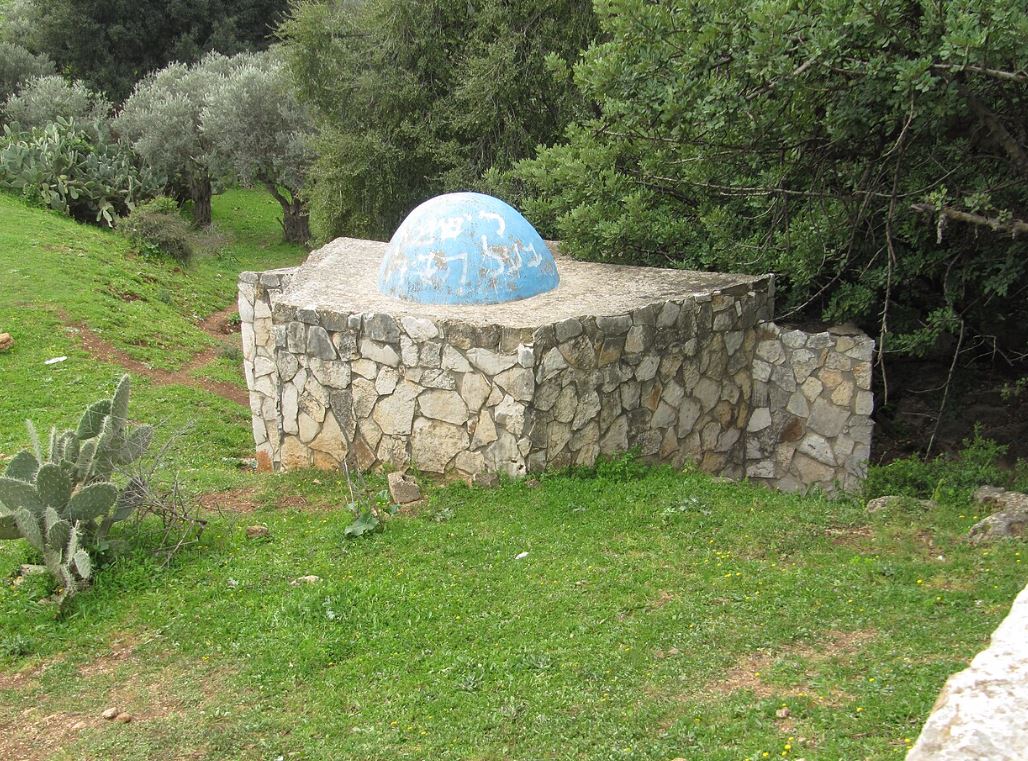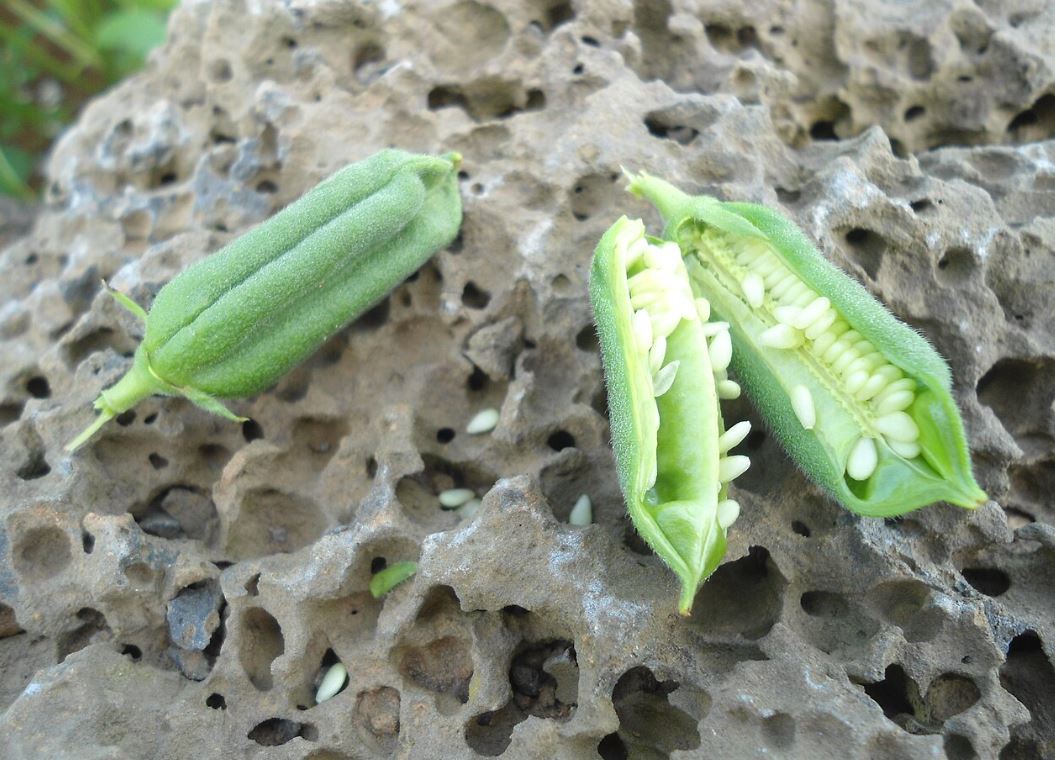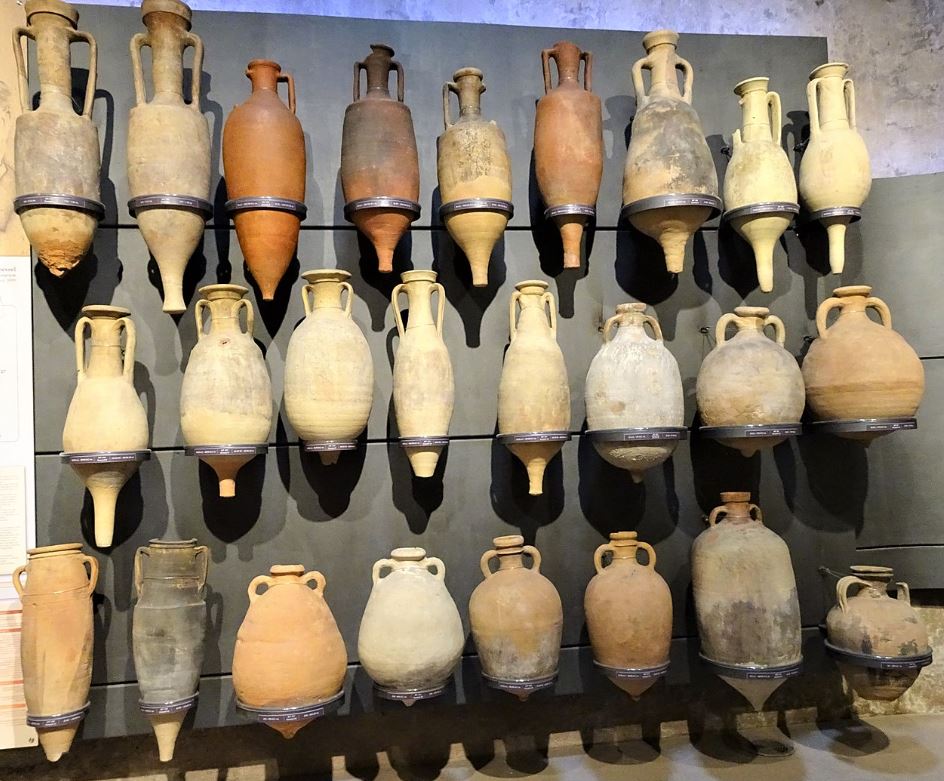The Mishnah on Avoda Zarah 29b lists various items that are forbidden for Jews to receive from Gentiles. Among the things we would expect like wine and vinegar, is an odd item: חרס הדרייני, translated as Hadrianic earthenware. A few pages later the Gemara gives two explanations for what this is:
“What is Hadrianic earthenware? Rav Yehuda says that Shmuel says: It is earthenware of Emperor Hadrian. When Rav Dimi came, he said: There was virgin soil that no man had ever tilled before, and [Hadrian] tilled it and planted grapevines in it]. And they placed this wine in white jugs, and the jugs absorbed the wine. And they would break the jugs into shards and carry the shards with them, and anywhere that they stopped, they soaked [these shards in water] and drank [the water].” (Avodah Zarah 32a)
The first explanation is easy to understand. Hadrian was a famous Roman emperor, active in the early second century CE, who had a huge impact on the Jews of Judea. While he is responsible for many positive developments in the Roman world, and is known as one of the “Five Good Emperors,” in Judea he was known as “Hadrian, may his bones rot.” This is because of his role in the traumatic Bar Kokhba Revolt. That terrible destruction, combined with Hadrian making a pagan city called Aelia Capitolina on the ruins of Jerusalem, have made his name go down in infamy in Jewish sources. No wonder that pottery named for him would be forbidden.
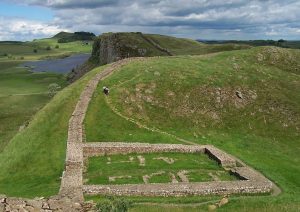
Part of Hadrian’s wall in northern England
Adam Cuerden, Public domain, via Wikimedia Commons
The second explanation of the Gemara is intriguing and unusual. Maimonides and Rabbi Ovadia Bartenura, in their respective Mishnah commentaries, offer a variation on this explanation. Instead of merely putting the wine into jugs that absorbed its flavor, they say that the wine and the clay are actually kneaded together to make the pottery, thereby imbuing the shards with wine in an even more intense way. However, this explanation does not really tell us why the pottery was named for Hadrian. Perhaps his large and extensive army made soldiers’ rations become associated with him. Professor Zeev Safrai says the word is not “Hadrianic” but rather “Adriatic,” i.e., originating from the Adriatic Sea off the east coast of Italy.
Wine was a staple drink throughout the Roman Empire, used for everyday purposes as well as for celebrations. Judaism sees wine as an important element in celebration (see here). Greek and Roman culture took the idea of wine drinking to extremes with the celebrations of Dionysus/Bacchus and his cult of wine.
Wine in the Roman period was fermented in dolia, large clay vessels found all over the Roman world. Clay was known as a good material for fermenting the wine, much better at preserving the taste and smell than metal. This is illustrated in the classic story about Rabbi Yehoshua and the emperor’s daughter:
“as the daughter of the Roman emperor said to Rabbi Yehoshua ben Ḥananya, Woe to glorious wisdom in an ugly vessel. Rabbi Yehoshua ben Ḥananya said to her: does your father keep his wine in simple clay vessels? The emperor’s daughter said to him: Rather, in what, then, should he keep it? Rabbi Yehoshua ben Ḥananya said to her: You, who are so important, should put it in vessels of gold and silver. The emperor’s daughter went and said this to her father. He put the wine in vessels of gold and silver and it turned sour. . .” (Taaanit 7a)
Once the wine was prepared, it was shipped all over the empire in amphorae. These clay vessels typically had a pointy bottom so that they could placed in a rack on Roman ships, tied together and brought safely to ports all over the Mediterranean. The amphorae were often stamped, on the neck, rim or handles. These stamps are invaluable for archaeologists because they usually state the place of origin and the date the wine was made. This helps us track Roman trade as well as winemaking. The amphorae were usually not reused and were discarded after delivery; sometimes they were used in the fill of buildings, helping us to date structures. A major wine producing center was Pompeii and after it was destroyed with the eruption of Vesuvius in CE there was a crisis in wine supply.
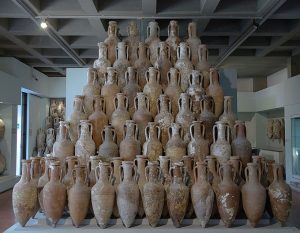
Amphorae
Clemensfranz, CC BY-SA 4.0 <https://creativecommons.org/licenses/by-sa/4.0>, via Wikimedia Commons
Did the Jews of Judea drink Italian wine despite Rabbinic prohibitions? We have clear evidence that Herod at least did. In his palaces in Herodion and Masada archaeologists found amphorae with seals from Italy. In the Masada storerooms were inscriptions testifying that the amphorae contained Italian wine produced at various dates between 27 and 14 BCE. One inscription reads “Philonianum from the vineyards of Lucius Laenius.”
Herod was not satisfied with importing wine, he also wanted to produce his own. Recently, enormous dolia were discovered in the new excavations at Herod’s palace in the Judean desert, Herodion. Samples were taken of the residue and they were found to contain wine that was being fermented at the site. Did Herod drink his own wine or did he export it to Judea’s neighbors?
Despite all the evidence we have of wine production and trade, we do not have any (so far) of “Hadrianic earthenware.” Did Roman soldiers really carry wine-soaked shards with them to create “instant wine,” something like our soup in a cup products of today? Roman texts like Pliny the Elder do talk about soldiers’ rations and mention a drink called posca, a mix of vinegar, water and herbs. A fascinating connection to our Gemara is a quote in a biography about Hadrian, the Historia Augusta:
“Though more desirous of peace than of war, he kept the soldiers in training just as if war were imminent, inspired them by proofs of his own powers of endurance, actually led a soldier’s life . . . and cheerfully ate out of doors such camp-fare as bacon, cheese and vinegar (posca in the Latin text)” (Historia Augusta Hadrian 10:2)

A depiction of the Roman soldiers of the Praetorian Guard 1st century CE
Christophe Jacquand, CC BY-SA 4.0 <https://creativecommons.org/licenses/by-sa/4.0>, via Wikimedia Commons
Is this posca what the Gemara meant by the wine-soaked shards? And did they know the connection to Hadrian?
Meanwhile, in modern day winemaking, an Italian winery called Vinum Hadrianum promotes the fact that their wine is preserved in amphorae made from the same clay-rich soil that the grapes are grown in, creating “an unbreakable bond between soil and wine.” Perhaps they have discovered the secret of our Gemara.




